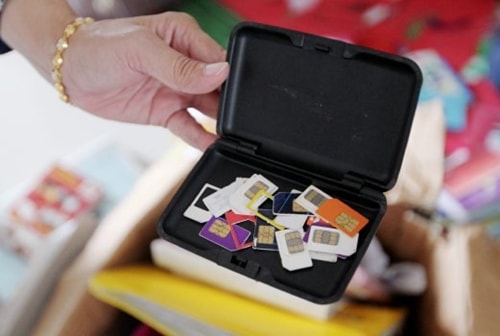How do countries manage telecommunications subscribers?
In many countries, subscribers are required to provide not only a photo but also a fingerprint when registering a phone number.
In some countries likeUSA, Germany, Japan, Singapore..., SIM registrants only need identification documents because there is a national electronic personal information database system.All transactions are linked to the citizen's ID information, including telecommunications services.
However, not many countries have such a data system.Biometric identification measuresIt is increasingly chosen by telecommunications officials, although according to Mr. Nguyen Duc Trung, Director of the Telecommunications Department (Ministry of Information and Communications), "the cost is quite high and the procedures are much more complicated than taking photos".
|
Thailand requires SIM buyers to take a photo or use fingerprints. Photo:The Nation |
InThailandFrom December 15, 2017, people must register information when purchasing new SIMs, both prepaid and postpaid, at service centers and retail outlets nationwide equipped with biometric identification tools.
The buyer’s fingerprints will have to match the data in the government’s ID card and citizen database. In addition to fingerprints, facial recognition can also be used, depending on the type of device at the point of purchase of the SIM. After the identification process, the service centers will send the user’s data to the network operator and will not retain any information. For foreigners, their faces must also match the photo on their passport.
ReutersThe system has been in place in northern Thailand since June, where insurgents have used prepaid SIM cards to trigger bombs. But nationwide, the new rules are more aimed at maintaining security in mobile banking.
As atPakistan, this countryhas asked mobile subscribers to authenticate their identities using biometrics, in a bid to build a national database to curb terrorism. Terrorists are believed to use junk SIMs to communicate with each other. Nearly 27.5 million of the 103 million SIMs that were activated were later blocked due to insufficient information.
Similarly, September 2017,Indiamade it mandatory for mobile users to link their SIMs to their Aadhaar identity cards (which also contain biometric data such as fingerprints and irises). The move is aimed at preventing criminals, fraudsters and terrorists from using SIMs registered in ordinary people's names.
Saudi ArabiaThis policy has been in place since 2016. The country’s Information and Communications Technology Commission requires all SIM cards in circulation to be linked to fingerprint data stored at the National Information Center. By July 2017, unregistered subscribers will be locked.Gulf Newssaid the purpose of this is also to prevent fraud.
Prepaid subscriber management processBangladeshsame. According toBDNews24, more than 100 SIM cards here have been authenticated using users' biometric characteristics, equivalent to more than 76% of SIM cards. However, even after this operation, Bangladeshi authorities said many people still used SIM cards for illegal activities. Therefore, in 2016, they had to add a regulation limiting each person to a maximum of 5 SIM cards, instead of 20 as before.
Nigeriathen applied both photo and fingerprint scanning system to register SIM. This process was approved by the National Assembly in 2011 and completed in 2013. In 2015, a similar campaign was launched. This was to create an accurate database to track SIM usage, fight fraud and prevent criminals from using pre-activated SIMs.
|
More and more countries want to regulate prepaid SIMs. Photo:New Straits Times |
After a somewhat lax initial period, like Vietnam, many countries have begun to tighten SIM management.UMBRELLAMr. Le Dang Dung, Deputy General Director in charge of foreign investment promotion of the Military Telecommunications Group (Viettel) said,liveTanzania- In the country where Viettel has been operating for 3 years now, people also have to take fingerprints when registering for a subscription, not to mention other information is also very strict, must ensure accuracy.
LIVEPeru, customers must provide personal information and photos when registering for a subscription. However, in this country, the national database system on residents is quite synchronous and is managed by identification code. Therefore, when customers register information, the network operator will have to connect to buy data from the management agency to verify the personal information of the subscriber, so there is no way to fake documents.
Subscriber information is managed on two levels, one for the network operator and one for the management agency. State agencies also periodically check the data updated by the network operators. If a business provides incorrect or incomplete information, it will be heavily fined, according to Mr. Dung, which can be up to millions of dollars.
Meanwhile, atMexico, the mandatory registration of information with SIM (RENAUT) was applied from 2010, but had to stop in 2012. The reason was because of concerns about personal data security and many people had difficulty registering due to lack of identification documents. Since 2014, the country has shifted to regulations with network operators to address fraud, such as managing the list of stolen devices or managing the unique IMEI code of each phone.
Ecuadoralso focuses on IMEI registration. The network operator will have to store this code with each customer's SIM. Therefore, every time a customer buys a SIM, the network operator will have data of both the IMEI number and the SIM.



